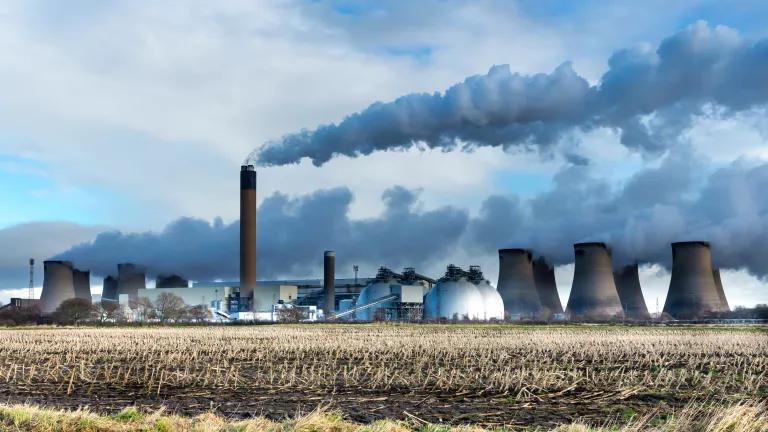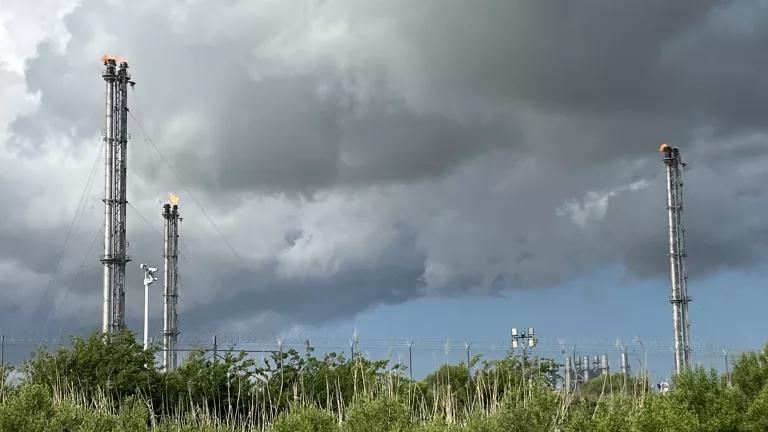UK Politicians Warn Biomass Not a Safe Bet for Net Zero
Politicians from all major parties released a letter to the Government’s Energy Secretary, expressing significant concerns about the UK’s decision to rely on bioenergy with carbon capture and storage (BECCS) to meet net zero commitments.

Drax Power Station—the UK's largest biomass power plant
A committee of UK politicians from all major parties released a letter to the Government’s Energy Secretary today, expressing significant concerns about the UK’s decision to rely on bioenergy with carbon capture and storage (BECCS) to meet net zero commitments.
This is a big deal!
For the Environmental Audit Committee (EAC) to question BECCS – a cornerstone of the UK’s net zero plan – shows that it’s becoming increasingly difficult to deny the damaging impacts of burning forest biomass for electricity.
This letter adds to the growing drumbeat of evidence against biomass electricity, with the UK’s Biomass Policy Statement hinting at a shift in position and even one of the Government’s own ministers telling colleagues there are “real problems” with biomass energy.
Here are the 4 main takeaways from the Committee’s letter:
1. The Government should not ignore the serious risks BECCS poses to nature and the climate
The Committee agreed with the warnings of scientists, environmental groups, and others that BECCS could pose a major risk to the climate and nature. Logging to produce wood pellets to burn at biomass plants impacts biodiversity, imperiling both species and ecosystems the world over.
2. BECCS is risky and the Government has no backup plan to meet net zero
In developing the letter, the Committee heard evidence from experts that BECCS and similar technologies are extremely nascent and may never actually materialise at scale–let alone work. The Committee even highlighted evidence suggesting that the more power a BECCS plant produces, the less carbon it can capture, and vice versa. Betting our planet’s future on a technology that may never actually materialise OR reduce emissions – which is exactly what experts predict – is ludicrous. Add to the mix the fact that this technology will be mind-blowingly expensive and negatively impact biodiversity and people and you have a recipe for disaster. The Committee noted that the Government has NO backup plan to achieve net zero goals, asking the Government for its Plan B if BECCS doesn’t work. But why is the Government making something so terrible Plan A in the first place?
3. Even if it works, BECCS will be super expensive
Even if it works – which, as mentioned above, is totally uncertain – the Committee reiterated that BECCS will be extremely expensive to deploy, with a new BECCS power plant potentially costing more than £30 billion (similar to new nuclear power plants). Of course, that’s why the industry needs billpayer funds to make it happen. The number one concern the Committee heard from bioenergy industry representatives was the need for Government funding to make BECCS happen. But the UK Government is already spending billions of pounds each year to subsidise industrial-scale bioenergy. Why throw even more at an uncertain and expensive idea when that money could go to true renewables like wind and solar, which are less expensive and proven to actually work?
4. The UK’s use of imported wood pellets for biomass may not be sustainable
The Committee rightly noted that importing wood pellets for biomass from other countries is likely negatively impacting climate and biodiversity in these places. Currently, the UK imports 97% percent of its wood pellets from overseas (producing just 270,000 tonnes while importing 8.9 million tonnes), including the U.S., Canada, and the Baltics. But while the UK claims such sourcing meets its sustainability criteria, on-the-ground investigations show the opposite, including sourcing biomass from clearcuts of mature hardwood forests and vast quantities of whole trees being ground into pellets to burn in power plants. It’s hard to look at the images from these investigations and conclude that burning forest biomass for energy is good for the environment in any way. The letter refers to the Climate Change Committee’s David Joffe’s statement that “[t]here are big challenges to ensuring the sustainability of biomass grown outside the UK. It is not impossible but it is very difficult. I am sure you have talked to Drax. It will tell you all the things that it is trying to do, but ultimately it is very difficult. It is not something that the UK should be relying on at large scale in terms of biomass imports for greenhouse gas removals. There can be a small contribution but no more." Well said.
So…bioenergy and BECCS pose serious risks to nature and the climate, will be extremely expensive, and may not work. The Committee didn’t mention it, but air pollution from pellet mills also harms the health of vulnerable communities of color in the U.S. Southeast, where many mills are located. All in all, it doesn’t sound like something the UK should be depending on to solve the biggest crisis ever to face mankind.
The good news is it’s not too late. The UK government can – and should – reverse course starting with BEIS Secretary Kwasi Kwarteng’s response to the EAC (due out April 14) and culminating in its Biomass Strategy, which will be released later this year. The government should redirect biomass subsidies to true renewables like wind and solar (as well as other investments like home insulation and electric vehicle charging) and commit to no new biomass subsidies for a REAL way to meet net zero goals while protecting people and the planet.




